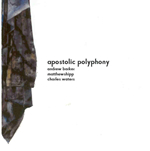|
|
 |
Dusted Reviews
Artist: Andrew Barker/Matthew Shipp/Charles Waters Album: Apostolic Polyphony Label: Drimala Review date: Jun. 10, 2003 |

|
|
|
 |
Celebrating Brevity
Many contemporary free jazz performances follow only one dynamic arc. Often, it seems as if the art of the episode – the brief, inconclusive excursion – has been lost. In light of this, it is refreshing that the three musicians on Apostolic Polyphony – Charles Waters on alto sax and clarinet, Matthew Shipp on piano, and Andrew Barker on drums – improvise episodically. Though they dig in deeply from time to time, the trio are never far from a scene change.
A player might effect such a change by simply laying out, creating a tense vacuum that the other two must fill. Waters does this to excellent effect on "three-part invention," the fifth section of the continuous performance that takes up the first six tracks. Spurred on by Shipp's dark, miasmic accompaniment, the reedman, on alto, builds to a breathless, squealing peak only to suddenly cease, leaving Shipp and Barker to face off warily.
The players calculate their entrances with great care as well. "One-three invention," seemingly an encore piece, opens with Shipp playing a dense solo and sounding somewhat uncertain. Waters murmurs in on clarinet, casting the piece as a kind of ballad as he caresses the pianist's lines. Barker, ever attuned to the reedman (his long-time partner in the Gold Sparkle Band) begins to flutter his brushes in agreement.
Though Shipp occasionally sounds tentative here, the two Gold Sparklers seem thrilled to be playing in this setting, and they pulsate passionately throughout. Barker is an exciting, fleet drummer whose playing crackles with groove even when it’s ametrical; he dances across his snare drum and ride cymbal in a manner reminiscent of his marvelous contemporary Nasheet Waits. On "three-two invention," left alone with Shipp, the drummer surges ahead in meter only to lapse intriguingly into rubato. On "part-two invention," a skipping, buoyant duet featuring Waters on alto, Barker employs this same device to great propulsive effect. Waters's saxophone work, particularly on "part-two invention," reveals a knack for motivic development and a compelling sound that is gritty, bright, and urgent, but it is his clarinet work which impresses most. He shows a quiet restraint when playing the instrument – particularly on "two-part invention," in which I hear several nods to Benny Goodman's "Body and Soul" – that he seems less apt to employ on alto. These two are players to watch, and I anxiously await the next "Sparkle Project" release, on which Ken Vandermark joins Barker and Waters.
By Hank Shteamer
|







